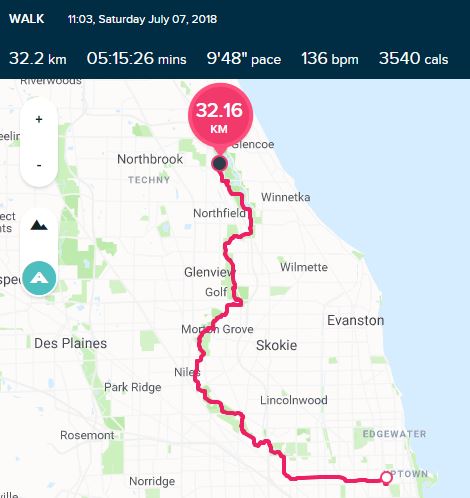I've finally gotten around to extending the historical weather feature in Weather Now. Now, you can get any archival report that the system has, back to 2013. (I have many more archival reports from before then but they're not online.)
For example, here's the last time I arrived in London, or the time I took an amazing photo in Hermosa Beach, Calif.
I don't know why it took me so long to code this feature. It only took about 4 hours, including testing. And it also led me to fix a bug that has been in the feature since 2008.
I despise Eddie Lampert. The harm he has caused Sears and the people who work for the company should be criminal. But he's going to continue to get rich driving it into the ground selling the real estate from its carcass.
Tomorrow, the last store in the company's home town will close, just shy of its 80th anniversary:
The Six Corners store, on the edge of Chicago’s Portage Park neighborhood, will shut its doors for the last time Sunday, two months shy of its 80th anniversary. The closure is part of Sears effort to turn around its business after years of losses and declining sales, but when the store rings up its final sale, the city will lose one more link to a hometown company that used to be the world’s largest retailer.
Plans to redevelop the site already have been announced, but neighbors have seen a redevelopment across the street drag on. They’re waiting to see whether Six Corners, at the intersection of Milwaukee and Cicero avenues and Irving Park Road, can regain its status as a bustling retail district.
Highland Park-based Tucker Development and Seritage Growth Properties announced in May that they were partnering to redevelop the Six Corners Sears and another in the Galewood neighborhood that closed last year. Both stores were among the more than 250 properties Sears sold to Seritage, a real estate investment trust, when it was spun off in 2015. Sears CEO Edward Lampert is an investor in Seritage and chairman of its board.
I hope Lampert gets careless, gets caught, and gets thrown in jail. But so far he hasn't done anything illegal, just immoral.
A predicted consequence of anthropogenic climate change is that the air won't cool as quickly overnight, leading to ever-increasing temperatures overall. It's happening, and it's dangerous:
Nationwide, summer nights have warmed at nearly twice the rate of days, with overnight low temperatures increasing 0.8°C per century since 1895, when national temperature records began, compared to a daytime high increase of 0.4°C per century. (Nights have warmed faster than days during other seasons, too.)
While warm summer nights may seem less concerning than scorching afternoons, “the combination of high daytime and high nighttime temperatures can be really lethal because the body doesn’t have a chance to cool down during the nighttime hours,” said Lara Cushing, professor of environmental epidemiology at San Francisco State University.
Those risks are higher in places where temperatures have historically been cooler, like coastal California. There people are less physiologically acclimated (the body can get used to higher temperatures up to a point) and less behaviorally adapted to hot weather.
“A hundred and five degrees in San Francisco is going to have a bigger impact probably than 105 degrees in Houston, Tex., where everybody has air conditioning and people are accustomed to dealing with high temperatures,” Dr. Cushing said.
Older people, the sick, and young children are especially at risk. So are agricultural, construction and other outdoor workers, who can no longer avoid the heat by shifting their hours to work earlier or later in the day. Similarly, homeless people who bear the full brunt of the elements get little relief.
Never mind the rest of the local environment. Slower overnight cooling puts stress on plants as well.
It's been a busy news day:
There was also an article on tuple equality in C# 7.3 that, while interesting to me, probably isn't interesting to many other people.
My dentist is all the way up in Hubbard Woods, which turns out to be a 21.3 km walk from my house. I know that because I walked it this morning. In fairness, I did it in two roughly-equal parts with a stop in downtown Evanston for lunch.
But my total time for the walk, 3:12:36, over what was almost exactly a half-marathon, implies a legal finishing time for the Chicago Marathon (6:30 allowed for the 42.2 km course).
I'm in a step challenge with a co-worker who got 11,000 ahead of me yesterday. Let's see how he does with the 28,000 I've gotten so far today.
And, as predicted, I have already blown away my 7-day personal step record with 159,083 so far this afternoon.
On Saturday I predicted hitting a new PR for total steps in a 7-day period on Thursday. I actually hit it yesterday: 151,791. I wound up getting over 18,000 yesterday, 65,500 for the weekend.
And now, I am sore. But I have to give a shout-out to my new Keens, the best hiking shoes I've ever bought, and which I wore for the first time on Saturday's walk.
The Washington Post enumerates them:
MYTH NO. 1
The Beatles objected to trading leather outfits for suits and ties.
“In the beginning,” John Lennon told Melody Maker, the British music magazine, in 1970, Brian Epstein, the Beatles’ manager, “. . . put us in neat suits and shirts, and Paul was right behind him. I didn’t dig that, and I used to try to get George to rebel with me.” Lennon later complained to Rolling Stone that by giving up leather for suits, “we sold out.” Soon, the story of the Beatles chafing against Epstein’s directives was part of the lore.
The other Beatles — and sometimes, Lennon himself — remembered things differently. “It was later put around that I betrayed our leather image,” Paul McCartney said in “The Beatles Anthology,” “but, as I recall, I didn’t actually have to drag anyone to the tailors.” George Harrison said that “with black T-shirts, black leather gear and sweaty, we did look like hooligans. . . . We gladly switched into suits to get some more money and some more gigs.” Lennon put it this way to Hit Parader in 1975: “Outside of Liverpool, when we went down South in our leather outfits, the dance hall promoters didn’t really like us. . . . We liked the leather and the jeans but we wanted a good suit, even to wear offstage.” To which he added, “I’ll wear a fucking balloon if somebody’s going to pay me.”
Yeah, that sounds like John.
I believed a couple of the other myths, too.
Back in June 2016, I walked 29 km in one go, and posted "I don't need to do this ever again."
You can see where this is going.
Here's what I did yesterday:

That distance, 32.2 km, is exactly 20 miles. I actually walked about 800 m farther than that because I accidentally paused my Fitbit for a few minutes. Also, the map's big red 32.16 km (which is just short of 20 miles) appears to be a rounding error as you can see from the official total at the top.
This time I walked up the North Branch trail, and I'm proud to say I walked the entire length of the Red Path, from Gompers Park in Chicago up to the Skokie Lagoons Trail in Glencoe. It's shadier, and leafier, and doesn't parallel a working railroad. I mean, you don't meet this guy on the Green Bay trail, for example:

The weather was nearly perfect: 25°C under crystal-clear skies. (I might have done better a few degrees cooler.)
And now for my personal records (PRs):
- Farthest distance in one continuous walk: 32.2 km
- Most steps in one continuous walk: 36,942
- Longest continuous exercise (including biking): 5 hours, 15 minutes
- Most steps in one day: 47,452
- Farthest walked in one day: 41.09 km
- Most active minutes in one day: 520
Depending on the weather, on Thursday I expect to hit another PR: most steps in a 7-day period. Currently that's 147,941 (set February 27th), but the 7 days ending yesterday totaled only 144,651.
My top-5 single-day step records are now:
Also, not for nothing, I am kind of annoyed with myself that I didn't sucker any of my friends into a step challenge this weekend.
Large areas of the planet are experiencing record heat this week, as predicted by the anthropogenic climate change hypothesis:
No single record, in isolation, can be attributed to global warming. But collectively, these heat records are consistent with the kind of extremes we expect to see increase in a warming world.
As we reported, Quriyat, Oman, posted the world’s hottest low temperature ever recorded on June 28: 109 degrees (42.6 Celsius).
That's right; in Oman overnight on June 28th, it never got below a potentially lethal temperature.
It's beginning to look a little like Christmas...on Venus.
Writing for NBC News, UT law professor Steve Vladeck reflects on how we celebrate today, and not Constitution Day, as the birthday of our nation:
As Lincoln would have it, Union soldiers weren’t fighting for the separation of powers, the Bill of Rights, or even the supremacy of the federal government (although that theme had often been invoked in the earlier years of the war). Instead, Lincoln suggested they were fighting for liberty from tyrannical government and the equality of all men (and, belatedly, women). This, despite the fact that no provision of the original Constitution reflected such principles (and several were expressly antithetical to them). Our “founding,” in Lincoln’s view, was not when we agreed to the legal system under which we currently operate; it was when we agreed to a more fundamental commitment to everyone’s right to “life, liberty, and the pursuit of happiness.”
What this choice of birthday suggests is that, whereas we are governed by the Constitution, our national ethos is more than just the sum of the rules of our legal system — which, too many times in American history, have indulged, if not directly perpetuated, inequality and oppression.
We aspire to more because that was our justification for breaking away from the British in the first place. And so, ever since 1870, July 4, and not any other date, has been recognized by Congress as the day on which we celebrate America’s birthday — defining our core national identity as one of egalitarianism, first and foremost.
This government, of the people, by the people, and for the people, shall not perish from the earth.